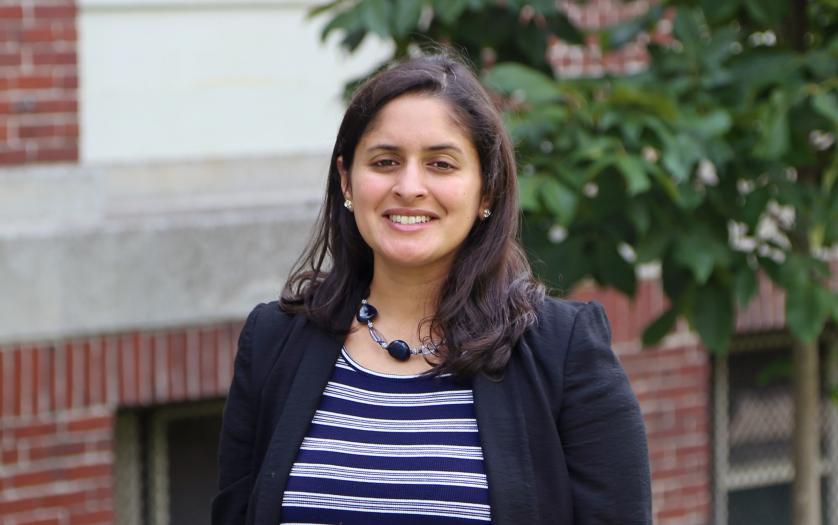February Faculty Spotlight - Anita Shukla

Anita Shukla joined the School of Engineering faculty in 2013. She was an NIH Ruth Kirschstein postdoctoral fellow in the Department of Bioengineering at Rice University, where she explored the influence of biomimetic geometries on stem cell differentiation. She received her PhD in Chemical Engineering from the Massachusetts Institute of Technology in 2011 as an NSF Graduate Research Fellow. Her graduate research focused on self-assembled biomaterials for drug delivery. Professor Shukla also received a Master of Science in Chemical Engineering Practice from MIT. She received her Bachelor of Science at Carnegie Mellon University in 2006 with majors in Chemical Engineering and Biomedical Engineering. Prof. Shukla is a recipient of the Director of Research Early Career Grant from the Office of Naval Research, the Dean’s Emerging Areas of New Science (DEANS) Award, the Richard B. Salomon Faculty Research Award, and the Dean’s Award for Excellence in Teaching.
Photo Credit: Amy Simmons / Brown University
1) When did you know you wanted to be a biomedical engineer/researcher?
Pretty early on - My father is also a professor and researcher at the University of Rhode Island, though he’s a mechanical engineer. So, as far as being an engineer, I knew engineers designed solutions to big problems. The interest in biomedical engineering developed slowly in high school as I got exposure to physiology and other biology classes. I started thinking I wanted to be a doctor, but then realized I wanted to design solutions for doctors to use. My background is actually chemical and biomedical engineering because the undergrad program I was in made BME’s double major with a more traditional engineering discipline that had been around for longer and I’ve found the chemical and biomedical combination is a perfect fit. As an undergrad I worked in many different labs. My freshman summer I worked in a lab back at home at the University of Rhode Island that was a mechanical engineering group but they looked at particles in all different solutions including in joints and prosthetics. That’s when I started thinking that BME could be something I was interested in. Following that I pursued several different research opportunities all with a biomedical focus and each of those further solidified my feelings that I wanted to be a biomedical engineer.
2) Of all of the publications you have written, is there one that you are most proud of? Why?
I’m proud of all of my publications because all of them are very hard work. Any publication where an undergraduate has been listed as an author, I feel particular pride in those. Of course I’m proud of my own from PhD. If I had to choose one specific publication though, it would probably be the first publication from my own lab here, which was with my student, Bethany. All of the research we’re doing is exciting to me, but this publication showed that my new lab was moving along well and producing results.
3) Did you ever do experiments that didn’t work?
All the time! I think maybe 75% don’t work, but that’s how we learn and end up accomplishing something. When they don’t work out you go back to the drawing board and figure out what you need to change or do differently. During my PhD, there was a time when I had been working on a part of my project, and I thought I was getting a certain result. After working on this for a year, I realized that the result was actually just interference from a different signal in the samples. That was a stressful time but that experience still has an influence on me today. I don’t trust any results until they have been verified in several different ways, and I instill the same critical analysis into my students. Despite some frustration, we have also come across interesting findings - out of what initially seemed to just be flawed experiments, and then we are able to investigate those findings further and that can lead to new research goals.
4) How do you choose the projects your group works on?
All of our projects have to be something I’m passionate about or interested in, which is generally issues that affect the larger global community. My lab focuses primarily on therapies for wound healing, particularly treatments for fighting infections that occur during wound healing, and we are also working on stem cell programming to regenerate wounds. Wound healing is a big issue that affects a lot of people, and the antimicrobial aspects are especially important. Some reports estimate that by 2050 there will be 10 million deaths worldwide due to antimicrobial resistance each year. This comes with a huge cost and impacts many lives. As far as connecting students with projects, I tend to do a lot of invested recruiting as opposed to just waiting for graduate student applications to arrive. I reach out to my network of colleagues to find qualified students with an interest in my work and then speak with these students about how I see them fitting in the lab. Once students have joined my lab I give them about a month to think about how they would approach the problem their project is focused on before jumping into the work and this can often help us to come up with new ideas.
5) What three qualities are most important for ensuring success as a young researcher?
Hard work, critical thinking (especially about your own work), patience.